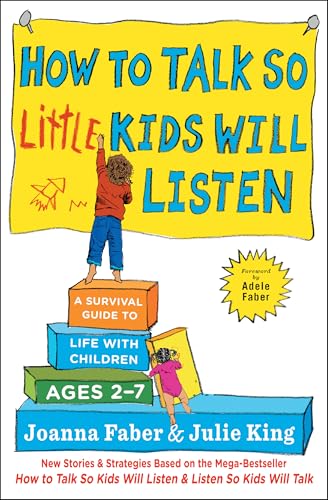How to Talk so Little Kids Will Listen
A Survival Guide to Life with Children Ages 2-7 (The How To Talk Series)
Joanna Faber
BOOK REVIEW

If you're a parent navigating the wild world of toddlers and early school-age children, How to Talk So Little Kids Will Listen by Joanna Faber might just be your new secret weapon. This book isn't merely a collection of tips; it's a transformative experience that delves into the chaotic labyrinth of parent-child communication. Bursting with insights and woven with empathy, it provides a lifeline for those moments when you feel utterly lost amidst the demands of childhood.
Faber, drawing from her extensive background in the field of child development, seamlessly merges her previous experiences with both parents and children into a manual that's not only informative but also engaging. She opens up a world where understanding the intricate emotional landscapes of kids aged 2-7 becomes less of a Herculean task and more of a dance-a dance where every step is supported by laughter, respect, and mutual understanding. 🕺
The book's brilliance lies in its relatability. Each page is infused with stories that echo your own experiences, giving you the uncanny feeling that Faber has been watching your family dynamics from an invisible perch. Whether it's facing tantrums that feel like they belong to a Shakespearean drama or handling bedtime negotiations akin to political treaties, her anecdotes resonate. The humor, sharp yet tender, serves to light the darkest corners of parenthood while offering practical tools that promise to ease your burden.
Have you ever found yourself in a spiral of frustration, desperately trying to get your little ones to comprehend simple requests? Faber's guidance shines in these moments. She advocates for techniques that prioritize connection over control. For instance, the art of setting limits without losing your cool, guiding children to regulate their emotions rather than simply extinguishing the flames of their fiery outbursts. The insights are not merely theoretical; they come alive through relatable scenarios that make you nod in recognition and sometimes even chuckle at your own past mistakes. 😂
In a world increasingly dominated by technology and distractions, Faber pushes back against the grain, encouraging parents to engage in heartfelt conversations that promote emotional literacy. This isn't just about talking; it's about listening-the kind of listening that acknowledges your child's feelings and affirms their existence. Many readers express gratitude for this approach, saying it saved them from the brink of frustration, while others have criticized it for being too idealistic in high-stress situations. But isn't that the essence of parenting? The constant push and pull between idealistic aspirations and the relentless chaos of daily life?
The emotional nuance Faber introduces extends far beyond mere communication strategies. It touches upon the vital topics of empathy, validation, and the sheer importance of maintaining a sense of humor through the storm. Every chapter unfolds like a journey, with the promise of newfound relationships where frustration ebbs away, replaced by moments of joy and pride as you unlock your child's world of thoughts and feelings.
But let's be real-the road to effective communication with little ones is riddled with challenges. This is where Faber's practical exercises come into play. She empowers parents, transforming them into facilitators of dialogue, leading children to articulate not only their needs but also their emotions. Her guidance empowers, creating a ripple effect that extends into every interaction, fostering deeper connections and healing those fragile parental bonds that often feel stretched thin.
As the pages turn, you may find yourself reflecting on your own childhood, contemplating how the wisdom of these techniques could have altered your own formative experiences. The generational cycle of communication-or lack thereof-becomes clearer; it's a thread that ties you to your past while urging you to break patterns in favor of more meaningful connections for your children. What could hurt more than knowing we're not equipping the next generation with the tools they need?
Readers' opinions on How to Talk So Little Kids Will Listen weave a rich tapestry of praise and critique. While many applaud the refreshing perspective and the practical application of Faber's techniques, some argue that the solutions proposed require an almost utopian level of calmness that isn't always feasible in the life of a busy parent. They ask, "What about when my patience runs thin?" The challenges of juggling work, personal life, and parenting create a tempest that can feel overwhelming. Still, if you allow yourself to embrace the core principles Faber lays out-patience, empathy, and connection-you just might discover the peace you seek amidst the chaos.
In a nutshell, How to Talk So Little Kids Will Listen is a treasure trove waiting to be explored. It's not a mere survival guide-it's an invitation to foster deeper relationships filled with laughter, understanding, and relentless love. Your kids deserve nothing less. As you delve into this powerful manuscript, you'll find yourself not just learning, but also transforming and evolving, perhaps even reflecting on your own childhood, as emotions swirl and connect across generations. 🌈 Don't let this opportunity slip through your fingers; each page holds the potential for profound change. Dive in!
📖 How to Talk so Little Kids Will Listen: A Survival Guide to Life with Children Ages 2-7 (The How To Talk Series)
✍ by Joanna Faber
🧾 448 pages
2017
#talk #little #kids #will #listen #survival #guide #life #with #children #ages #the #talk #series #joanna #faber #JoannaFaber